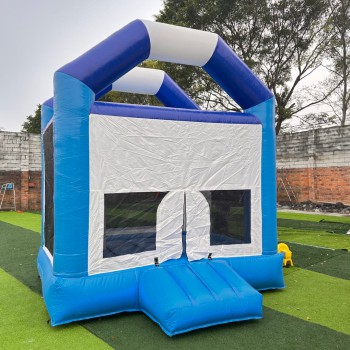7 Key Steps to Start Your Inflatable Bounce House Business
Rainbow City
2025.08.13 Starting an inflatable bounce house business offers a significant opportunity in the growing party rental market. A well-structured approach is essential for building a profitable and sustainable company. This guide provides seven key steps to help you launch your bounce house rental business successfully. Step 1: Develop a Comprehensive Business Plan A comprehensive business plan is the foundation for a successful party rental company. This document will guide your strategy and help you identify potential challenges before they arise. Your plan should detail your startup costs, target market, and pricing structure. Conduct Market Research and Define Costs Your primary customers will be families planning birthday parties, schools, churches, and organizations hosting community events. Understanding your local market will help you tailor your services and marketing efforts effectively. Your main startup costs will be your inventory, transportation, and insurance. Commercial-grade bounce houses are a significant investment, and it is important to source them from a reputable supplier to ensure you acquire durable, safe, and high-quality products. A single bounce house can generate approximately $188 per week, meaning a small inventory of four units could earn around $750 weekly [1]. Choose a Business Name Select a professional and memorable name for your business. The name should be easy to find online and reflect the fun and reliability of your party rental company. Ensure the name is not already in use in your state and that a corresponding website domain is available. Step 2: Select Your Legal Structure Choosing the correct legal structure is a critical decision that impacts your liability, taxes, and administrative requirements. The four most common business structures are the sole proprietorship, partnership, corporation, and limited liability company (LLC). Establishing a formal business entity such as an LLC or a corporation separates your personal assets from your business liabilities. This separation protects your personal property, such as your home and vehicle, in the event your business is sued. Step 3: Register Your Business and Finances After choosing a legal structure, you must formally register your business. This process includes registering for state and federal taxes and establishing separate financial accounts. You must apply for an Employer Identification Number (EIN) from the IRS, which is required for tax purposes. Depending on your business structure, you will have different tax obligations. There may also be specific state taxes, such as sales tax on rental services, that apply to your company. It is essential to open a business bank account. Commingling personal and business funds can "pierce the corporate veil," putting your personal assets at risk in a lawsuit. A separate account also simplifies bookkeeping and tax preparation. Step 4: Obtain Required Licenses and Permits To operate legally, you must secure all necessary federal, state, and local licenses and permits. These requirements vary significantly by location, so you must research the specific regulations in your area. Common requirements include: •A general business license to operate in your city or county. •Special event permits if you plan to set up at public parks, fairs, or festivals [2]. •Health and safety permits to ensure your equipment meets local standards. Some states, such as Texas, classify bounce houses as amusement rides. This classification requires annual inspections, state-issued certification stickers for each unit, and proof of minimum insurance coverage [3]. Step 5: Secure Business Insurance Insurance is non-negotiable for a bounce house rental business. It protects your company from financial loss in the event of an accident or property damage. Without adequate coverage, a single incident could jeopardize your entire operation. General liability insurance is the most critical policy, as it covers third-party bodily injury and property damage. Many states and public venues require a minimum coverage amount, often $1,000,000 per occurrence [3]. If you hire employees, you will also need to carry workers' compensation insurance as required by your state. Step 6: Build Your Online Presence and Systems In today's market, a professional website is your most important marketing tool. It serves as a digital storefront where potential customers can view your inventory, check availability, and book rentals. A poorly designed website can deter customers and damage your brand's credibility. Your website should feature high-quality photos of your inflatables, clear pricing information, and an easy-to-use booking system. You can also integrate rental management software to automate bookings, manage inventory, and process payments. This technology streamlines operations and improves the customer experience. Step 7: Market Your Bounce House Business Once your business is established, you must actively market it to attract customers. A multi-channel marketing strategy will help you reach your target audience and build a strong client base. Online and Offline Marketing Strategies •Online Presence: Develop your website and create profiles on key social media platforms like Facebook and Instagram. Use these channels to post photos of your bounce houses in action, share customer testimonials, and run promotional offers. •Content Marketing: Position your company as an expert by creating blog posts about party planning, event ideas, and safety. This helps build trust and improves your search engine visibility. •Local Marketing: Distribute flyers in community centers, partner with local businesses, and advertise in local publications. Attending community events and fairs is an excellent way to showcase your products and network with potential customers. Excellent customer service is one of your most powerful marketing tools. Positive experiences lead to repeat business and valuable word-of-mouth referrals [4]. Conclusion Launching a bounce house rental business can be a rewarding and profitable venture. Success depends on careful planning, legal compliance, and a commitment to safety and customer service. By following these seven steps, you can build a solid foundation for your party rental company and position it for long-term growth. 2025.08.13
Share your idea with our manager at the brainstorming session. Engage in creative discussions. Perfect for team members looking to innovate and contribute.
Rainbow City
Rainbow-City-Alabama-America-
TOP
